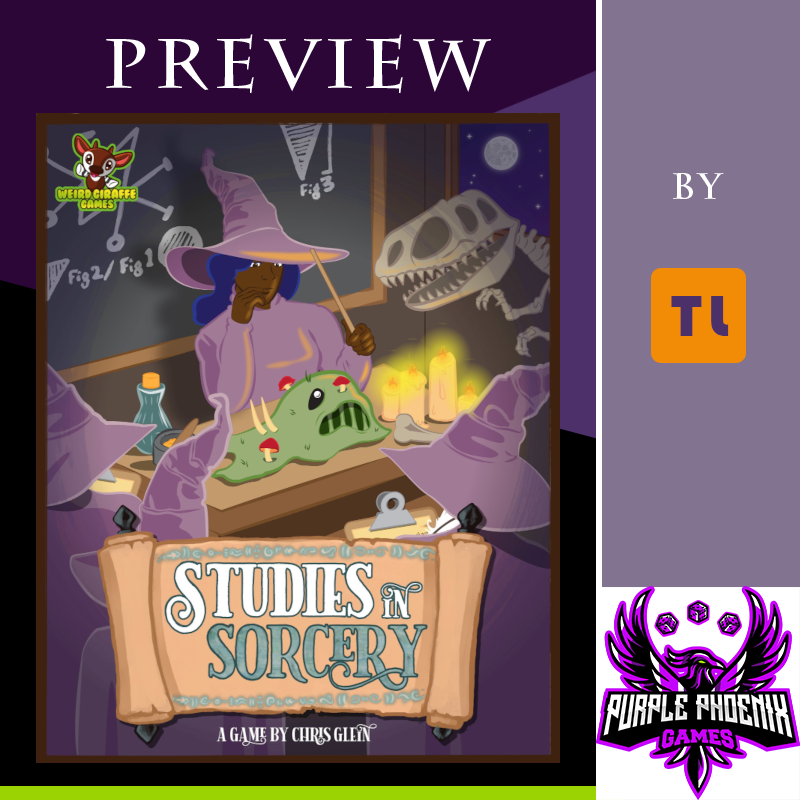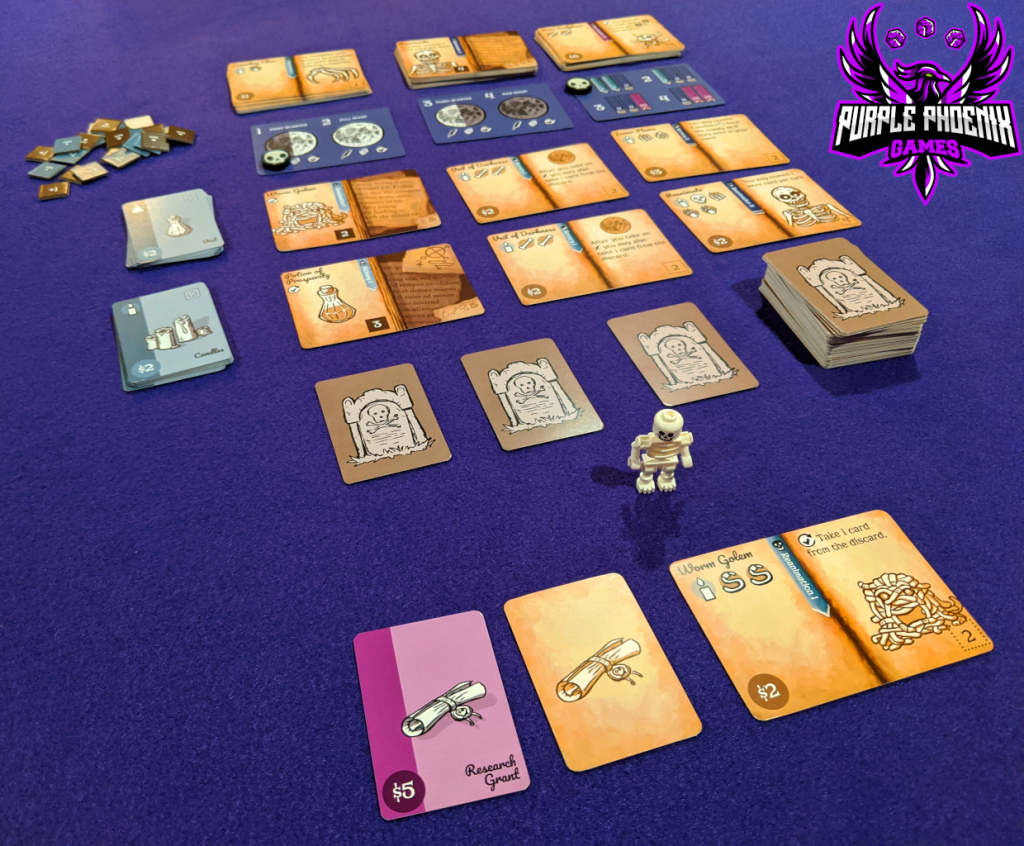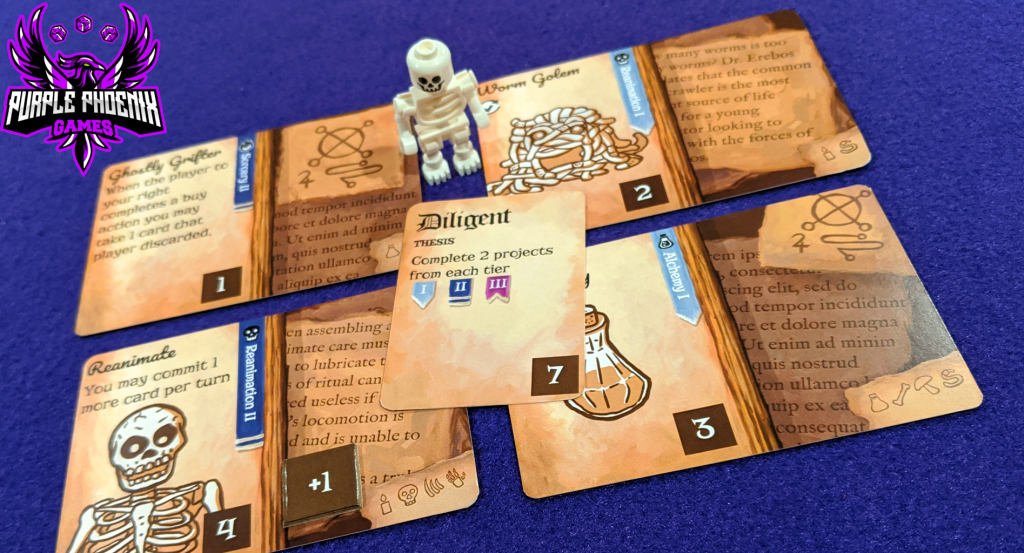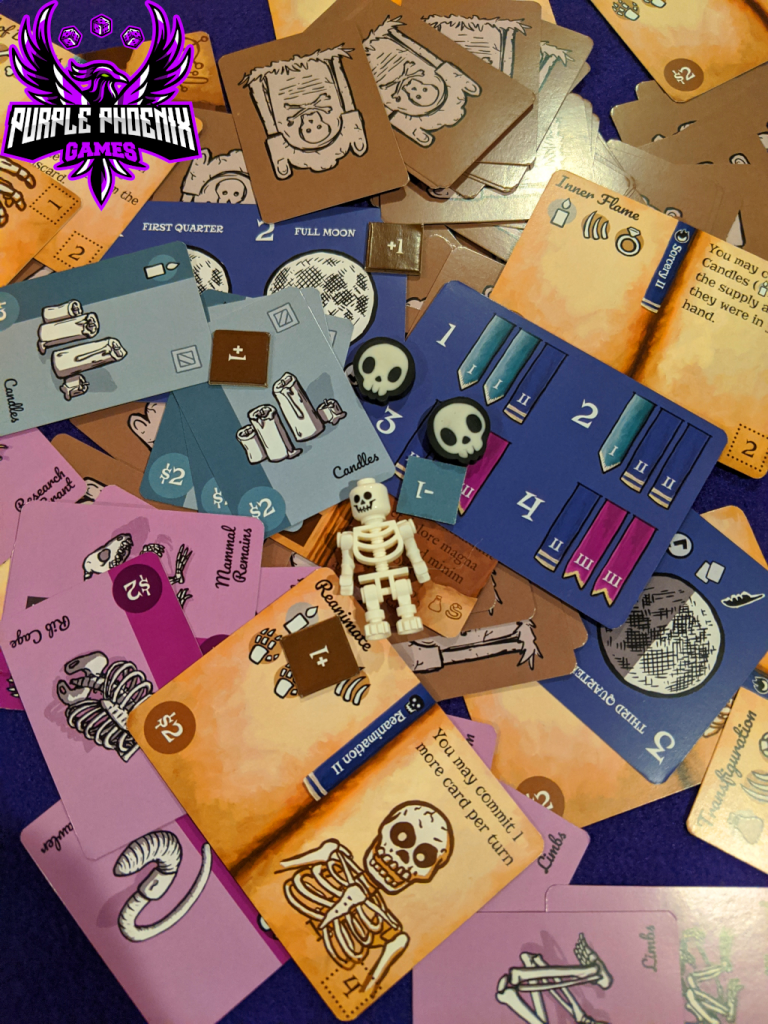
We’re all nerds here, right? What was the best class the gang took in the Harry Potter series? Defense Against the Dark Arts of course! Learning spells to protect ones’ self (oneself? themselves??) from an onslaught of dark spells looked so fun in the movies. *DISCLAIMER: I have never read a Harry Potter book. I made it one chapter and couldn’t do it, but I have seen the movies several times.* In any case, what if you could learn the other side of these spells? The offensive ones? Well that would be cool right? What if you could get a full master’s degree in Dark Arts? Welcome to Studies in Sorcery.
| Studies in Sorcery (2021) | Weird Giraffe Games |
| 1-4 Players | 30-60 minutes |
| Ages 10+ | BGG Weight – (not yet available) |
Studies in Sorcery is a competitive card game that uses elements from other well-loved games and puts them with a wonderful theme and some very interesting card synergies. The game takes place over four school semesters (rounds) and each semester lasts four weeks (turns). Can you students complete your thesis using the research grants you are given, or will you fall flat to repeat the program again?
DISCLAIMER: We were provided a prototype copy of this game for the purposes of this preview. These are preview copy components, and the final components may be different from these shown. Also, it is not my intention to detail every rule in the game, but to give our readers an idea of how the game plays. You are invited to back the game on Kickstarter launching October 6, 2020, order from your FLGS, or purchase through any retailers stocking it after it is fulfilled. -T
To setup, separate each deck of cards into like piles (Levels 100, 200, and 300 of the projects, graveyard cards, candles, vials) and shuffle them. Lay out the moon phase cards and semester tracker, placing the tracker tokens (skull erasers in the prototype) on the start of the cards to begin play. Set out the candles and vials in their own piles, as well as the point modifier tokens. Deal project cards according to the semester tracker in a 3×2 pattern under the moon phase and semester tracker cards like is shown in the photo below. Initially the graveyard pile will have three stacks of two cards each face-down next to the draw pile. Each player receives a research grant card, two thesis cards to choose one from, and two 100-level project cards from which the player will choose one. Give the first-player token (in this prototype it’s a cute LEGO skeleton) to the player who last attended school, and the game may begin!

Each player will be resolving actions, committing materials to their projects, and using completed project abilities each moon phase (turn). The actions one may take are: Dig, Buy, Cram, and Project Action. When a player uses the Dig action, they are searching for materials. A player can look at the items in the first pile of graveyard cards and take all the contents. If they do not like them, draw a card from the draw deck and place it on the first pile. Continue this for the next pile, and if unsatisfied the player may draw the top card from the draw pile OR either a candle or vial from the supply of stock cards.
Buy actions allow a player to use any unwanted materials or research grant monies to purchase additional candles, vials, or project cards from the middle of the table. To Cram, players may commit up to two materials from their hand to a project by placing the materials under the project cards. Project Actions allow players to use actions printed on any of their completed project cards. These can be very powerful.
Once each player has taken one of these actions, move the tracker token on the moon phase card to the next icon – Commit. To commit materials to projects, simply place the cards under the selected project (exactly like players do with the Cram action). Once all players have completed their commits, they may complete any projects that have sufficient materials by discarding the used materials and flipping the project card to its opposite side earning the printed points at the end of the game.
Play continues in this fashion for four turns each semester and the game lasts four semesters. Therefore the game will last 16 turns total. Whomever earns the most points for combinations of completed thesis cards, completed projects, bonus point modifier tokens, and one point for each $8 worth of materials in hand will be named Valedictorian of their class and winner of Studies in Sorcery!

Components. Again, this is a prototype copy of the game, and I know some things will be different in the final version. However, what we were provided is a bunch of cards that have great art, are good quality, and are very easy to read and understand. The cute first player token will more than likely become a different component in the end, and the tracker tokens probably will be changed as well, but these are great bits to include in a game like this. The only negative I have about components is that I wish there was MORE color. Most of the cards are brown-heavy, and it’s completely fine, but I would love to have splashes of weird colors here and there. Overall, I am very pleased with the components in this game. Weird Giraffe Games always has great components in their prototypes AND final games.
It is probably no surprise that I love this game. The theme is wonderful, the wonky art is great, and it’s more thinky than one might imagine. The game play can be somewhat quick, or players can take excruciating amounts of time to think through their turns and chain together impressive actions. One thing remains constant – 16 turns to complete your thesis cards can be a huge undertaking. My first time playing I chose a thesis card worth 7 points (even though the rulebook advised me not to include those for the first play). I wasn’t even really that close to completing the thesis, but I may have with another two or three turns. But then again, that card is worth 7 points for a reason – it’s SUPPOSED to be difficult. My suggestion: take the rulebook’s advice and remove those thesis cards for the first play. Don’t try to be a hero.
Ahhhhhhh! I want to play it again right now just so I can attempt that thesis card again. But there are other thesis cards in the game. And other strategies to apply. And really, when you can’t wait to play a game, that’s a sign of a fantastic game for that specific gamer. Will this be a gem for everyone? I don’t know. It certainly works for me and my circle of gamers.
If you are a fan of the Harry Potter series (even though this is NOT a Harry Potter game) and need a thinky card game with that sort of fantasy classroom theme, or if your collection is begging for something new and quirky, or if you just love Weird Giraffe Games’ catalog and need every game they offer (I wouldn’t blame you), then you need to give Studies in Sorcery a look. Please consider backing it on Kickstarter launching October 6, 2020. I know my collection just got a lot cooler with this one.

